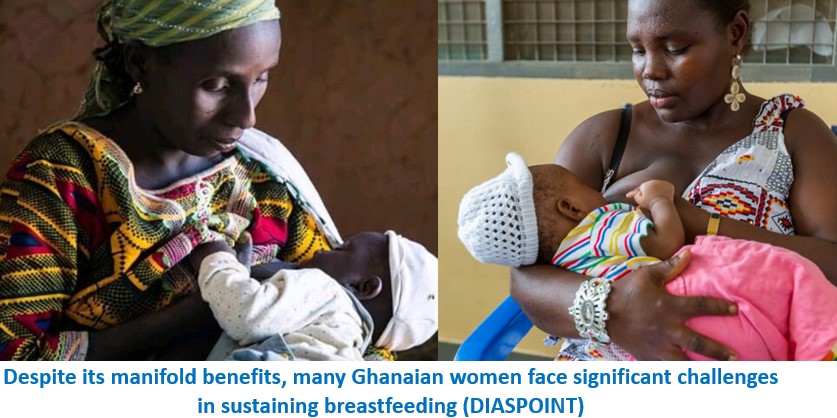Why Ghanaian women are struggling to breastfeed their babies for the recommended six months
Post By Diaspoint | August 8, 2023

As the global community observes Breastfeeding Week, it is a pivotal moment to assess whether Ghana has taken substantial strides to promote and encourage breastfeeding.
On August 1, a video was posted on Twitter on the United Nations World Food Programme’s (WFP) Africa page. It showcased Mutinta Hambayi, a mother and nutritionist from WFP, who emphasized that “for every dollar invested in breastfeeding promotion and protection, a country can generate up to [USD] 35 in economic returns.”
According to Hambayi and other credible sources, breastfeeding holds paramount importance for both infants and mothers. One of its primary advantages for children lies in its indispensable role in ensuring their health and survival. When an infant is breastfed they receive colostrum during the initial 72 hours. This substance acts as a shield of immunity and functions as a vaccine, offering essential protection. Early initiation of breastfeeding significantly curtails the risk of infant mortality by an impressive 44 percent. Moreover, breastfeeding contributes to reducing the likelihood of childhood obesity, asthma, cardiovascular diseases, and Type 2 diabetes. An added benefit is that breastfed children tend to excel academically, thus underscoring how breastfeeding also serves as an investment in human capital.
For mothers, breastfeeding offers significant advantages apart from the fact that it creates a special bond between mothers and their babies. It serves as a soothing experience and holds the potential to mitigate the risk of certain cancers. According to Hambayi, the promotion of breastfeeding isn’t just a decision; it’s one of the most astute investments a nation can undertake to construct its forthcoming prosperity. Beyond economic benefits, it fortifies the resilience of families. Thus, advocating for exclusive breastfeeding isn’t merely a practice; it’s a means to foster long-term well-being and ensure the growth of future generations.
Read More from original source
